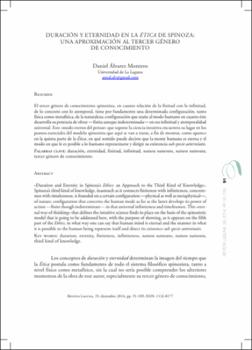Duración y eternidad en la Ética de Spinoza: una aproximación al tercer género de conocimiento
Date
2014Abstract
El tercer género de conocimiento spinozista, en cuanto relación de la finitud con la infinitud,
de lo concreto con lo atemporal, tiene por fundamento una determinada configuración, tanto
física como metafísica, de la naturaleza; configuración que atañe al modo humano en cuanto éste
desarrolla su potencia de obrar —finita aunque indeterminada— en esa infinitud y atemporalidad
universal. Este «modo eterno del pensar» que supone la ciencia intuitiva encuentra su lugar en los
puntos esenciales del modelo spinozista que aquí se van a tratar, a fin de mostrar, como aparece
en la quinta parte de la Ética, en qué sentido puede decirse que la mente humana es eterna y el
modo en que le es posible a lo humano representarse y dirigir su existencia sub specie aeternitatis. Spinoza’s third kind of knowledge, inasmuch as it connects finiteness with infiniteness, concreteness with timelessness, is founded on a certain configuration —physical as well as metaphysical—, of nature; configuration that concerns the human mode as far as the latter develops its power of action —finite though indeterminate— in that universal infiniteness and timelessness. This «eternal way of thinking» that defines the intuitive science finds its place on the basis of the spinozistic model that is going to be addressed here, with the purpose of showing, as it appears on the fifth part of the Ethics, in what way one can say that human mind is eternal and the manner in what it is possible to the human being represent itself and direct its existence sub specie aeternitatis.





